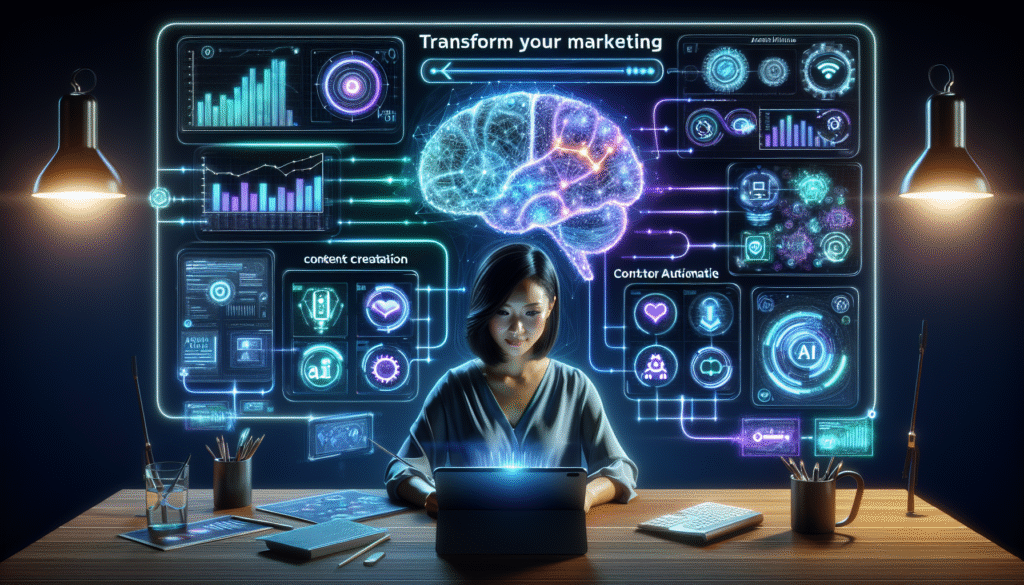Understanding AI Marketing Tools: Revolutionizing Digital Strategies
In the rapidly evolving landscape of digital marketing, AI marketing tools have emerged as essential instruments for marketers aiming to enhance their strategies. These tools harness the power of artificial intelligence to analyze data, predict consumer behavior, and automate tasks, allowing marketers to focus on creative and strategic aspects of their campaigns. As technology advances, AI marketing tools are becoming increasingly sophisticated, offering capabilities that were unimaginable a few years ago.
AI marketing tools encompass a wide range of applications, including customer segmentation, personalization, predictive analytics, and content creation. By leveraging these tools, marketers can gain deeper insights into their audience, tailor their messaging to individual preferences, and optimize their campaigns for better engagement and conversion rates. The integration of AI into marketing not only streamlines processes but also enhances the effectiveness of marketing initiatives.
One of the most transformative aspects of AI marketing tools is their ability to process vast amounts of data with incredible speed and accuracy. This allows marketers to identify trends and patterns that would be impossible to discern manually. For instance, AI can analyze social media interactions, website visits, and purchasing behavior to create detailed customer profiles. These profiles enable marketers to deliver personalized experiences that resonate with individual consumers, fostering stronger connections and driving brand loyalty.
The Role of AI in Digital Marketing: Unveiling New Possibilities
AI is transforming digital marketing by providing marketers with unprecedented access to valuable insights and automating complex tasks. In digital marketing, AI can analyze vast amounts of data to identify patterns and trends, enabling marketers to make data-driven decisions. This capability is particularly useful in areas such as search engine optimization (SEO), pay-per-click (PPC) advertising, and social media marketing, where understanding consumer behavior is crucial.
Furthermore, AI-powered chatbots and virtual assistants are revolutionizing customer service by providing instant, personalized responses to inquiries. These tools not only improve customer satisfaction but also free up human resources for more complex interactions. As AI continues to evolve, its role in digital marketing will expand, offering new opportunities for marketers to connect with their audience in meaningful ways.
AI’s ability to predict consumer behavior is another game-changer for digital marketing. By analyzing historical data, AI can forecast future trends and provide marketers with insights into what products or services are likely to be in demand. This predictive capability allows marketers to tailor their strategies to meet consumer needs proactively, ensuring that they stay ahead of the competition. Additionally, AI can optimize ad placements and budgets in real-time, maximizing the return on investment for marketing campaigns.
Empowering Marketers with AI: Enhancing Creativity and Strategy
AI for marketers is not just about automation; it’s about empowerment. By utilizing AI, marketers can enhance their creativity and strategic thinking. AI tools provide marketers with the ability to test and optimize their campaigns in real-time, ensuring that they achieve the best possible results. This empowerment extends to content creation, where AI can assist in generating ideas, writing copy, and even designing visuals.
Moreover, AI empowers marketers by providing them with actionable insights that can drive decision-making. With AI, marketers can forecast trends, understand customer preferences, and anticipate market shifts, allowing them to stay ahead of the competition. As AI technology continues to advance, its potential to empower marketers will only grow, making it an indispensable tool in the modern marketing toolkit.
AI’s role in enhancing creativity is particularly noteworthy. By analyzing successful campaigns and identifying key elements, AI can suggest creative directions and help marketers develop innovative strategies. It can also automate the process of A/B testing, allowing marketers to experiment with different approaches and refine their tactics based on real-time feedback. This iterative process leads to more effective campaigns and a deeper understanding of what resonates with the target audience.
Streamlining Efforts with Marketing Automation: Boosting Efficiency and Effectiveness
Marketing automation is one of the most significant benefits of integrating AI into marketing strategies. By automating repetitive tasks, marketers can focus their energy on more strategic activities. AI-driven marketing automation tools can handle everything from email campaigns to social media posting, ensuring that marketing efforts are consistent and efficient.
Automation also plays a crucial role in lead nurturing and scoring, allowing marketers to identify and prioritize high-quality leads. By automating these processes, marketers can ensure that their sales teams are focusing on the most promising prospects, increasing conversion rates and driving revenue growth. As marketing automation tools become more advanced, they will continue to provide marketers with the ability to streamline their efforts and maximize their impact.
One of the key advantages of marketing automation is its ability to personalize communication at scale. AI can segment audiences based on various criteria, such as demographics, behavior, and preferences, and deliver targeted messages that resonate with each segment. This personalized approach enhances engagement and increases the likelihood of conversion. Additionally, automation tools can track the performance of campaigns and provide insights into what works and what doesn’t, enabling marketers to refine their strategies continuously.
Exploring the Best AI Marketing Tools: Choosing the Right Solutions for Success
The market is flooded with AI marketing tools, each offering unique features and capabilities. To make the most of AI in marketing, it’s essential to choose the right tools that align with your goals and objectives. Some of the best AI marketing tools available today include platforms for email marketing, customer relationship management (CRM), and social media management.
For example, tools like HubSpot and Salesforce offer AI-powered CRM solutions that enable marketers to manage their customer interactions more effectively. Meanwhile, platforms like Mailchimp and Constant Contact leverage AI to optimize email marketing campaigns, ensuring that messages reach the right audience at the right time. As AI technology continues to evolve, new tools will emerge, offering marketers even more options to enhance their strategies.
When selecting AI marketing tools, it’s important to consider factors such as ease of use, integration capabilities, and scalability. Tools that offer intuitive interfaces and seamless integration with existing systems can significantly enhance productivity and reduce the learning curve for marketers. Additionally, scalable solutions that can grow with your business ensure that you remain agile and responsive to changing market conditions.
The Future of AI Marketing: Embracing Innovation and Transformation
As we look to the future, the potential of AI in marketing is limitless. Breakthroughs in generative AI, as of 2025, are paving the way for more personalized and engaging marketing experiences. Generative AI can create content that resonates with audiences on a deeper level, from personalized videos to dynamic web pages that adapt to user preferences in real time.
The practical impact of these advancements is already being felt across industries, from retail to healthcare, where AI-driven marketing strategies are enhancing customer engagement and driving growth. As AI technology continues to advance, marketers will have access to tools that can predict consumer behavior with greater accuracy, enabling them to create campaigns that are more targeted and effective.
In conclusion, the integration of AI into marketing is not just a trend; it’s a transformative shift that is reshaping the industry. By embracing AI tools and techniques, marketers can unlock new opportunities for growth and innovation, ensuring that they remain competitive in an ever-changing landscape. As AI continues to evolve, its role in marketing will expand, offering marketers the ability to connect with their audience in more meaningful and impactful ways.
Looking ahead, the key to success in AI marketing will be adaptability and continuous learning. Marketers who stay informed about the latest developments and are willing to experiment with new technologies will be best positioned to leverage AI’s full potential. By fostering a culture of innovation and embracing AI-driven strategies, businesses can navigate the complexities of the digital age and achieve sustainable growth.






